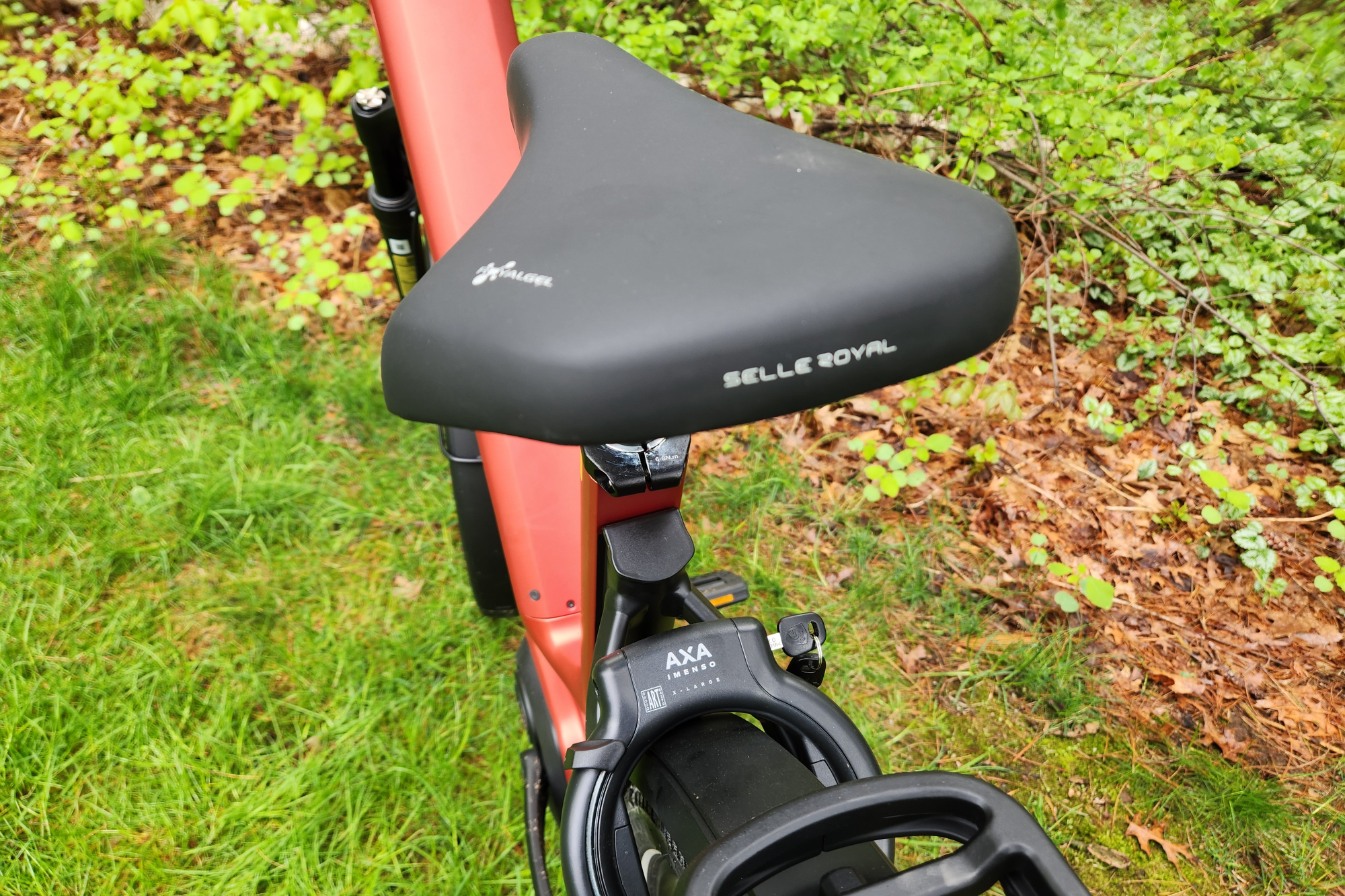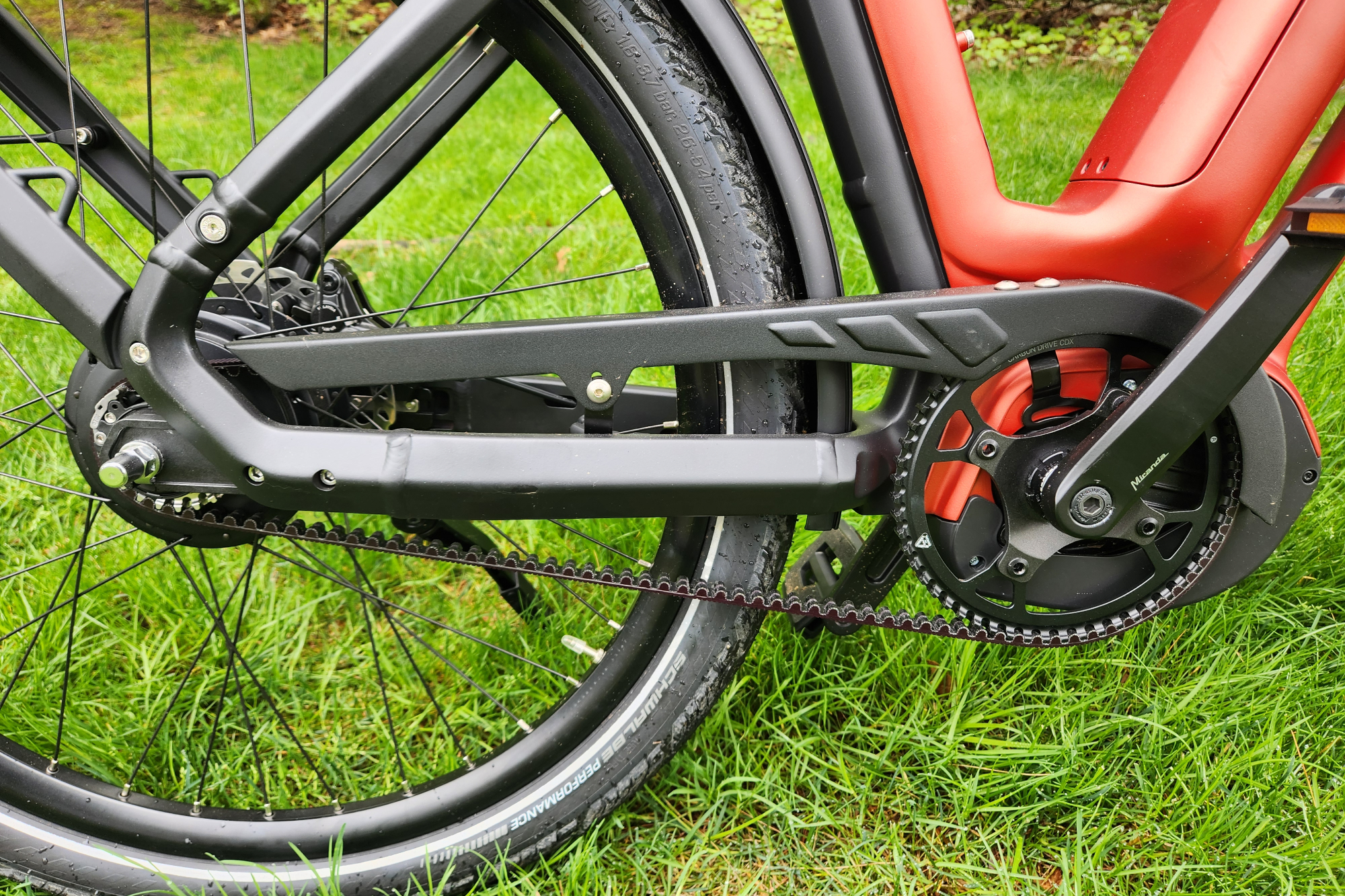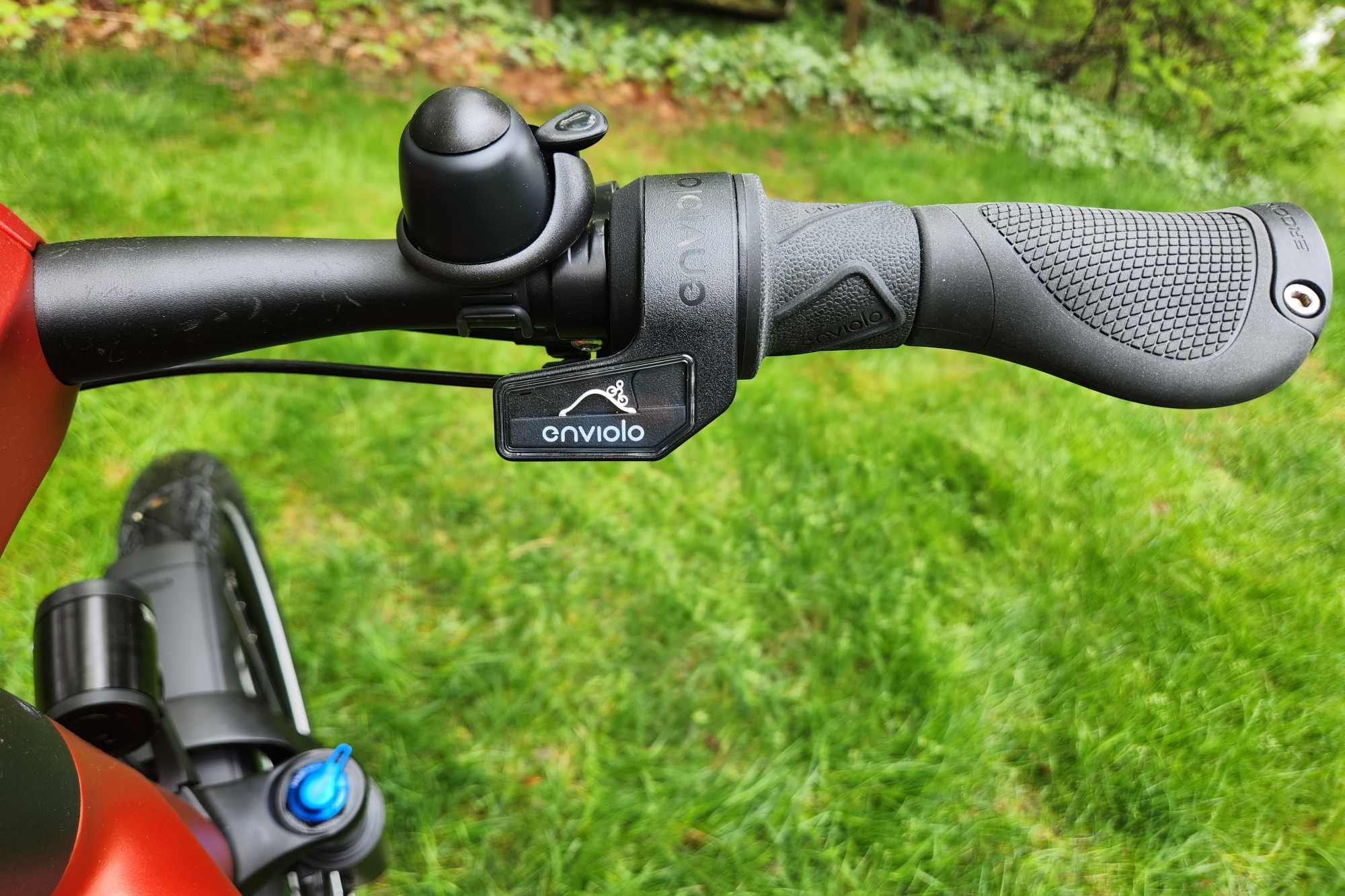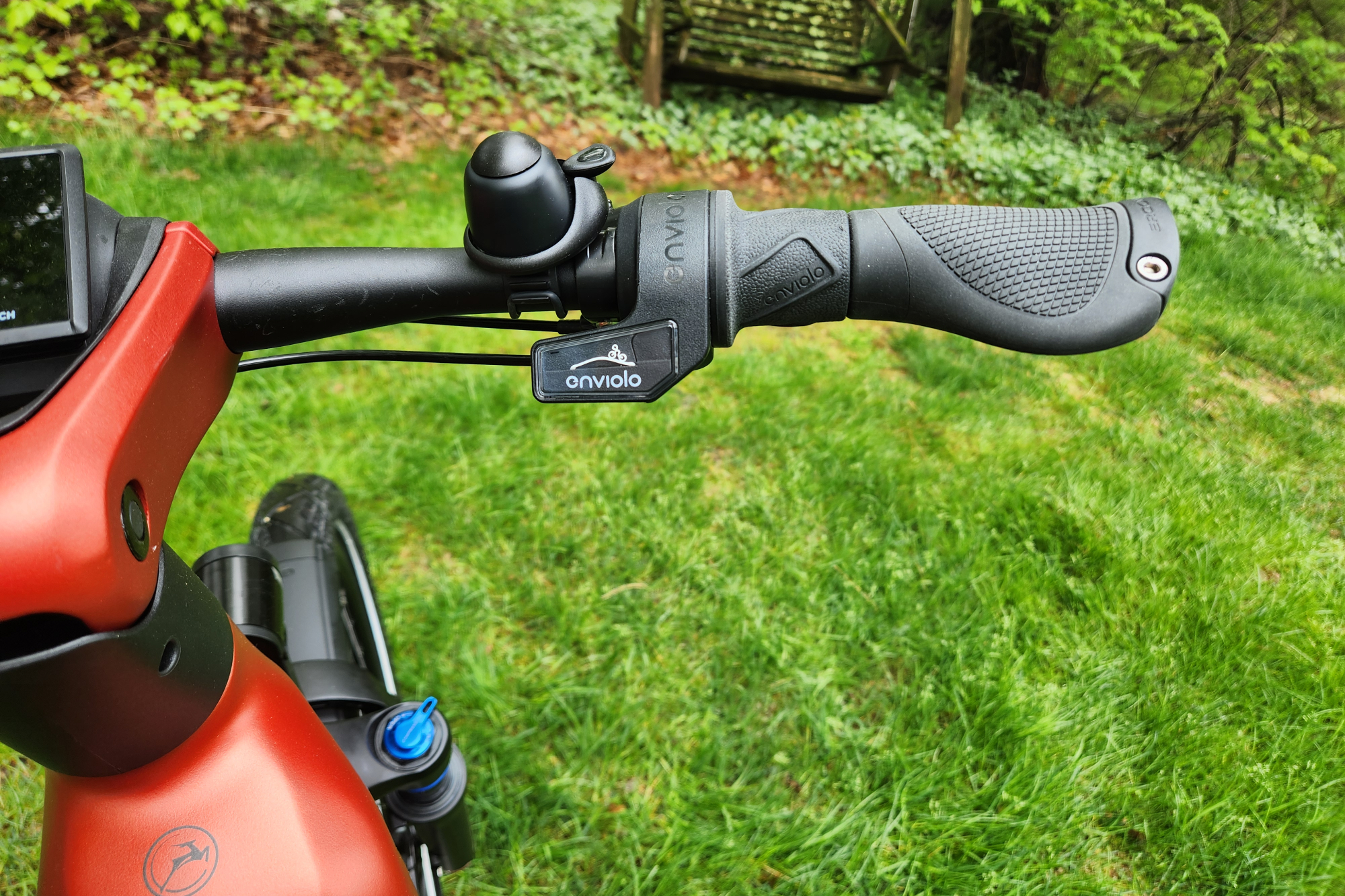“When I relaxed and stopped trying to think it through, the Eclipse's systems worked together smoothly.”
- Highly evolved using latest technologies
- No compromises in the complete system
- Rated up to 100 miles per charge
- Smart drive system
- Tire lock system preinstalled
- This much quality isn't cheap
- Mirrors are not standard

The Gazelle Eclipse C380+ HMB is hands down one of the most attractive e-bikes I’ve ever seen. Judging appearance is subjective, however, so it’s also important to state from the top that this Gazelle checks the boxes for almost every feature, function, component, and quality I look for when I review e-bikes.
The Gazelle Eclipse is well-made and beautifully finished. It’s comfortable to ride and extremely easy to operate. In Class 3 mode, the Eclipse easily holds at 26 to 28 miles per hour, and the bike’s powertrain has ample torque for fast starts and steep inclines. If all of the above impresses you, you’re not alone.
But one factor gave me cause to pause. The Gazelle Eclipse C380+ HMB’s starting price is $6,000.
A quick look at the images in this review shows the Eclipse isn’t a racing bike or a mountain bike built for extreme duty. So, how can you justify spending that much money on an e-bike, no matter how nice it is? That was the challenge for this review.
Gazelle Eclipse: The primary and best use

The best perspective for considering the Gazelle Eclipse is to start with where it’s made and the company that makes it.
The Royal Dutch Gazelle bicycle company started business in 1892 in Dieren, Netherlands. Gazelle produces about 300,000 bikes annually and is the market leader in its own country, one of the most bicycle-centric countries in the world.
According to the Cycling Facts report published by the Dutch Ministry of Infrastructure and Water Management, the Netherlands has 17 million residents and 23 million bicycles, including 2 million e-bikes.
The nicely finished Eclipse utilizes strictly top-of-the-line components from major e-bike suppliers.
Among many other fun facts in the report, one-third of all trips of distances up to 7.5 kilometers (4.67 miles) in the Netherlands are made by bicycles. The report also credits e-bikes for a significant increase in home-to-work traffic.
Wherever you live, the highest and best use cases involve using the Eclipse e-bike as one’s primary form of personal transport in a city or town and for daily commuting.
Gazelle Eclipse: What makes it special

The nicely finished Eclipse utilizes strictly top-of-the-line components from major e-bike suppliers. A Bosch Smart System Performance Line Speed mid-drive electric motor provides plenty of smooth power with 750-watts of continuous output and 85 Newton meters of torque. The Gates carbon belt drive is quieter, cleaner, maintenance-free, less noisy, and much longer-lasting than a conventional steel chain.
The C380+ HMB also has an Enviolo Continuously Variable transmission, so you don’t have a gear stack and derailleur on the rear hub. A slight turn of the Enviolo’s twist shift controller adjacent to the right handgrip adjusts the virtual gears as needed.
Gazelle has another Eclipse model, the T11 HMB, which has an 11-speed Shimano drivetrain instead of the Gates belt drive and Enviolo transmission. The T11 HMB sells for $500 less than the C380+ HMB, but the simplicity, easier maintenance, and longer lifespan are worth the extra expediture, especially if you’re already in such a high price bracket.
The Eclipse has a 36-volt, 20.1Ah battery. Gazelle rates it at 750 watt-hours of power, although multiplying the voltage by the amp output is actually 723 Wh. The Eclipse has four drive modes with different power output amounts: Eco, Tour, Auto, and Turbo.
The rider geometry is perfect for a comfortable, upright riding style.
Gazelle estimates the maximum range per change from 50 to 100 miles, depending on drive mode, rider weight, speed, incline, air temperature, and other factors. With an included 4-amp battery charger you should be able to fully charge an empty battery in about five hours. It should take about half that time to charge from 20% to 80%.
There is a Bosch remote control unit on the left side of the handlebar to switch modes and a bright Kiox 300 display with tons of information. There’s also a Gazelle app you can pair with your smartphone. I didn’t use the app much and focused primarily on riding and how the various mechanical and electronic components worked together.
All of the components on the Eclipse are top-flight, including 180mm rotors for the front and rear hydraulic disc brakes, a very nice Suntour Mobie front suspension fork, and a 100-lumen headlight.
Gazelle Eclipse: Comfort and handling
Gazelle bicycles and e-bikes are sold through licensed dealerships, which can help buyers find the correct size among the three available frame sizes. The step-through frame helps with easy mounting and dismounting, especially if you have something attached to the standard MIK-compatible rear rack carrier. It’s also easy to adjust the seat height, handlebar angle, and height.
The rider geometry is perfect for a comfortable, upright riding style. The Eclipse has no rear suspension, but I found that the combination of the adjustable Suntour front fork and the Selle Royal Essenza Plus gel seat took care of most of the little bumps and eased the ride over speed bumps.
I rode the bike on grass-covered hills and fields, but didn’t take it on rugged trails or heavy-duty off-road terrain. The 27.5-inch wheels with 2.2-inch wide Schwalbe tires were fine for street use.
Gazelle Eclipse: Riding impressions

The Eclipse doesn’t have a throttle and relies solely on rider pedaling and a combination of pedal sensors in conjunction with the Bosch drive mode and the Enviolo CVT to find the right gearing and powered assistance. At first, I made it too complicated by trying to figure out the best combination of settings.
When I relaxed, stopped trying to think it through, and let the bike systems work together, the experience was enjoyable and easy to ride. Other than setting the initial drive mode (which really only seemed to matter when I wanted to go as fast as possible), the only adjustment I had to make while riding was to occasionally twist the Enviolo controller for a bit easier pedaling if I found myself going too slow on an incline.
I tend to think of e-bike riding as a series of mini adventures, but I can see that riding the Gazelle Eclipse for daily commuting could be a lot less dramatic and more relaxing. This realization helped me appreciate the 130-plus years of bike-building experience behind the Eclipse.
Gazelle Eclipse: Upgrades and accessories

I mentioned above the Eclipse’s standard Carrier MIK Profile rack, which accepts a growing range of compatible, easy-to-connect carriers, seats, and other accessories. The Eclipse also includes an Axa fat tire security lock with a key already installed on the bike.
I wish one or two mirrors came standard with the Eclipse. Mirrors are essential when riding in traffic or even in small towns. I’ve been surprised several times by bicycles or other e-bikes that seem to appear silently out of nowhere when least expected. Mirrors can help.
Our take

There is so much to like about the Eclipse, but the $6,000 price tag can make it a difficult purchase decision. If you are seeking a high-quality, dependable e-bike for commuting or daily use, perhaps even to replace a second or even primary car, certainly consider the Gazelle Eclipse, particularly the C380+ HMB model I tested with the Gates carbon belt drive and the Enviolo continuously variable transmission.
There are other very good choices for urban riding and commuting. In particular, I like the Aventon Solera.2 commuting e-bike and Velotric’s T1 very smart city bike. But if the price tag isn’t a stopper, you can’t go wrong with the Gazelle Eclipse C380+ HMB.









